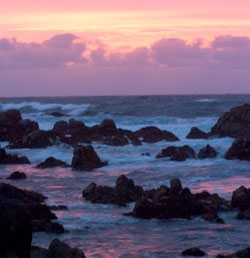Middlebury Environmental Journalism Program Selects Fellows

MIDDLEBURY, Vt. ― Administrators of the Middlebury College Fellowships in Environmental Journalism recently announced 10 fellowship recipients for 2013. Started in 2007, the program is designed to support intensive, year-long reporting about environmental issues by working and aspiring journalists. Graduate fellows each receive $10,000 to pursue their reporting projects.
“Every year it’s an embarrassment of riches, but this year it was harder than ever to choose,” said Bill McKibben, environmentalist, writer and the program’s director. “We could easily have funded 30 stories, and it never gets any easier to pass on something we love. It’s thrilling to see how many of our applicants are breaking ground, uncovering news, and giving context to the most important stories of our time, and we’re grateful for every proposal we receive.”
The subjects of this year’s stories include hydro-fracking and water consumption in China, the female seafood divers or haenyo of Korea’s Jeju Island, and the link between climate change and terrorism in Nigeria. Three Middlebury alumnae and one Middlebury undergraduate are among the recipients. Fellows were selected based on letters outlining their proposed projects and their writing samples.
The fellows meet in the fall at Middlebury College’s Bread Loaf campus in Ripton and the following spring at the Monterey Institute of International Studies, in California, with a prominent visiting reporter, McKibben, and the program’s associate director Christopher Shaw, a visiting lecturer in the Middlebury Department of English and American Literatures. There they plan rigorous year-long reporting, edit finished stories, absorb the lore of journalism, and make important contacts with each other.
This fall the visiting reporter will be Ted Genoways, a contributing writer at Mother Jones and editor-at-large at OnEarth, who won six National Magazine Awards as editor of Virginia Quarterly Review. His book on Hormel Foods and the Great American Recession is forthcoming from HarperCollins. Eric Bates will serve as the visiting reporter in the spring. He was features and political editor for Rolling Stone for 10 years, covering the Obama Presidency and winning seven National Magazine Awards. Bates was also investigative editor at Mother Jones. Past visiting faculty have included Ted Conover, Rebecca Solnit, Alan Weisman and David Abram.
This is the sixth year that the fellowships have existed. “We’re starting to see what amazing jobs our past fellows are doing, what a true fellowship they make, and what potential exists among all of our applicants,” Shaw said. He noted that a number of past fellows have gone on to get book contracts, publish stories in major magazines, and secure jobs as editors.
“It’s harder to survive as a freelancer without exactly these kinds of grants and aid, and ours was an early model for others just starting up,” he added, pointing out that a lot of charitable organizations have stepped in to fill the gap left by diminished newspaper ad revenue and the Internet to fund good reporting in their areas of concern.
“With everything going on in the news it’s easy to see the importance of programs such as ours, and why they need to survive,” McKibben concluded. “We’ve just been so lucky and privileged to work with all these fine young journalists.”
This year’s 10 fellows—four of whom are from Middlebury—and their topics are:
• Erika Eichelberger, Washington, D.C.: The Boko Haram of Nigeria and how climate change drives global jihad.
• Maddie Oatman, San Francisco, Calif., Middlebury Class of 2008: How the “framing” of the western United States pine beetle infestation justifies questionable forestry practices.
• Zaheena Rasheed, Male, Maldives; Middlebury Class of 2012: In Burma, the link between ethnic violence and a new oil pipeline for the Chinese market.
• Stephanie Joyce, Unalaska, Alaska, Middlebury Class of 2011: How pirated “Alaskan” king crab from the Sea of Okhostk enters the U.S. market.
• Jesse Newman, Brooklyn, N.Y.: Lead contamination of abandoned rail beds.
• Kiya Vega-Hutchens, New York, N.Y., Middlebury undergraduate fellow and Class of 2014: In Puerto Rico, a Trump development’s encroachment on a historic runaway slave enclave.
• Aaron Reuben, New Haven, Conn.: A new link between fossil fuel pollution and increased rates of Alzheimer’s disease.
• Jaeah Lee, San Francisco, Calif.: Hydrofracking in China and its effect on the country’s water supply.
• Puck Lo, Brooklyn, N.Y.: The female haenyo seafood divers of Jeju Island, Korea, and a new U.S. Naval installation.
• Brooke Jarvis, Indianola, Wash.: Deep-sea mining off the coast of New Guinea.
For more information about the Fellowships in Environmental Journalism, visit www.middlebury.edu/sustainability/fech/fellowships.

